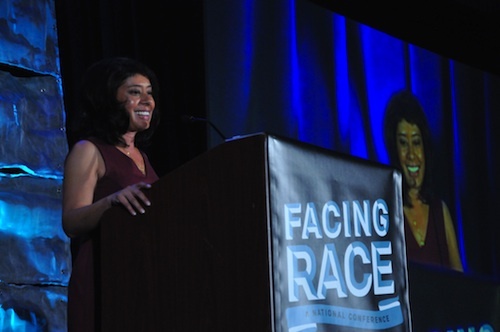Demographics are not destiny: Facing Race considers the future of race in a diversifying America

Rinku Sen shared her vision of building a multiracial coalition for racial justice at the Facing Race conference held last week in Dallas. (Photo courtesy of Race Forward.)
For anyone following the conversation about racial demographics in America, 2043 is a prophetic year. It's the year that the U.S. Census Bureau has projected the nation will become majority minority, and it was a year on the minds of many at the Facing Race conference in Dallas last week.
Facing Race, a biennial national conference organized by Race Forward: The Center For Racial Justice Innovation (formerly the Applied Research Center), gathered artists, researchers, activists, and many others to discuss issues of race and racial justice. This year's conference ran from Nov. 13 to 15 and attracted a record 1,600 participants, including over 400 from Southern states. It was the first Facing Race conference held in the South to commemorate the 50th anniversary of the passage of the Civil Rights Act, said Race Forward Executive Director Rinku Sen.
Operating on a "race and" philosophy that recognizes how race intersects with other identities and social issues, the conference offered sessions covering a broad array of topics, including education, health care, immigration, economic justice, LGBT rights and more. Recent events like Ferguson, the election, and President Obama's anticipated action on immigration were hot topics, but many participants were also grappling with what it will mean for America 30 years down the road when non-whites make up a numerical majority of the country.
"One, I hope we'll stop using the word 'minority' to describe ourselves," remarked Key Jackson, a community organizer based in New Orleans, speaking on a plenary panel about multiracial youth organizing.
Another panelist, Jaime-Jin Lewis, a racial equity trainer and activist and former executive director of Border Crossers, talked about her concern that people would equate the shift in numbers to a shift in power. "White supremacy is still codified and institutionalized. It's not just a numbers game," Lewis said.
During the conference's closing plenary, Sen shared her vision of a multiracial coalition for racial justice over the next 50 years and laid out three narratives of how this is currently playing out.
One is the thinking that with all the mixing and interactions among races, we'll just date our way to pluralistic harmony. A second narrative is about competition for limited resources that pits groups against each other just to get a place at the bottom of the ladder.
The third narrative that's rarely discussed is a profound silence about one another. Groups don't show up for or speak out on behalf of each other's causes. In the next "story of us" over the coming 50 years, Sen said, we must figure out how to do this.
The conference also held a plenary spotlighting organizing efforts in the South, which featured panelists representing Mississippi, North Carolina, and Texas who discussed the role of race, faith and culture in Southern organizing. The conversation touched on the changing racial dynamics in the region, which has seen rapid growth in its immigrant, Latino and Asian populations.
"Immigrant conversations and racial conversations beyond black and white – these are new conversations [in the South],” said Bishop Tonyia Rawls, founder and executive director of the Freedom Center for Social Justice in Charlotte, North Carolina.
While these conversations are just getting underway, they are expanding, Rawls told Facing South after the panel: "That’s where a lot of organizing work is going on -- people connecting with each other and needing to understand more about how everyone landed where they landed."
Bishop Rawls was joined on the panel by Cristina Tzintzún, executive director of the Workers Defense Project based in Austin, Texas, and Chokwe Antar Lumumba, an attorney and community activist in Jackson, Mississippi and son of the late Mayor Chokwe Lumumba, who was remembered at the end of the panel.
Tzintzún and Lumumba, coming from places in the South where demographic shifts are well underway, echoed the sentiment that numbers alone don't shift power. Minorities already make up the majority in Texas, and the city of Jackson is nearly 80 percent black. Yet despite these numbers, they said, racial injustice persists.
In Texas, where Democratic gubernatorial hopeful Wendy Davis lost by a 20-point margin to Republican Greg Abbott, Tzintzún emphasized the need for advocates to look not only statewide but at the local and municipal level to cultivate a grassroots movement that pushes for racial justice and holds local officials accountable. These efforts should involve developing leaders of color, including African-American leaders, who Tzintzún said have been overlooked in the rush to reach out to the state's large Latino population.
Lumumba and Rawls also discussed the need to resist wedges that are driven between racial communities and their issues. Through their work, each has seen divides created between the African-American faith community and the LGBT community, and between low-income African Americans and Latino immigrants over jobs.
"Should that wedge be put in well and well established, we actually have to unbundle or debunk other stuff that has been institutionalized," Bishop Rawls warned. "Timing is relevant. We need to be having these conversations sooner rather than later."
Tags
Allie Yee
Allie is a research fellow at the Institute for Southern Studies and is currently studying at the Yale School of Management. Her research focuses on demographic change, immigration, voting and civic engagement.
